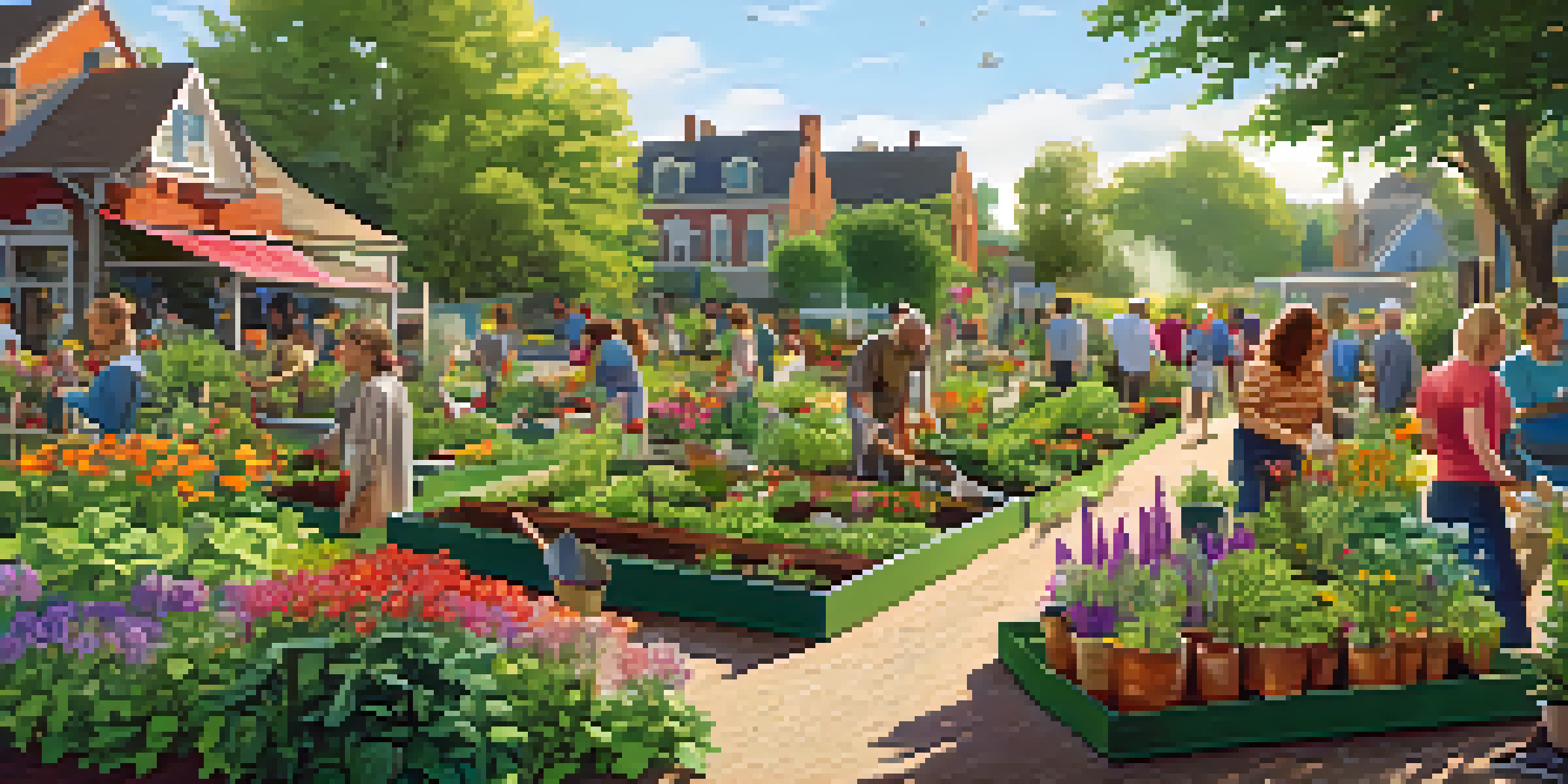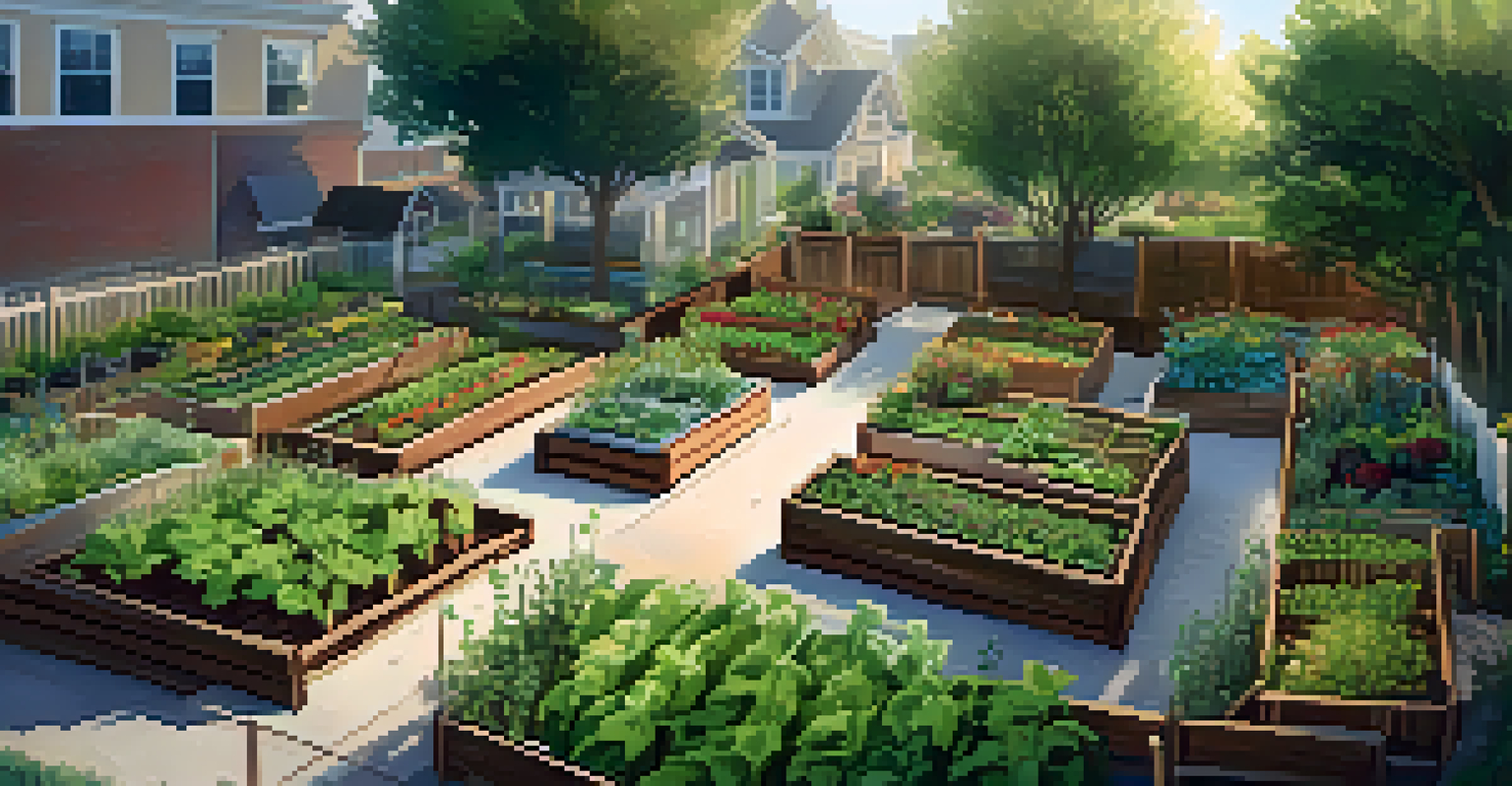Community Gardens: A Sustainable Solution for Austin

What Are Community Gardens and Their Benefits?
Community gardens are shared spaces where individuals come together to grow fruits, vegetables, and flowers. These gardens not only beautify neighborhoods but also promote sustainable practices, encouraging locals to cultivate their own food. By participating in a community garden, residents can experience the joys of gardening and reap the benefits of fresh produce.
The best way to find yourself is to lose yourself in the service of others.
Moreover, these gardens foster a sense of community by bringing people from diverse backgrounds together. They serve as a hub for social interaction, allowing participants to share gardening tips, recipes, and even create lasting friendships. In this way, community gardens enhance social cohesion, making neighborhoods more vibrant and connected.
Additionally, community gardens contribute to environmental sustainability. By utilizing organic gardening techniques, they reduce the need for chemical fertilizers and pesticides, promoting healthier ecosystems. This not only benefits the soil and local wildlife but also leads to cleaner air and water for everyone in the area.
The Rise of Community Gardens in Austin
Austin has seen a significant rise in community gardens over the past decade, driven by the city’s commitment to sustainability and community engagement. With an increasing number of residents interested in growing their own food, local organizations have stepped up to facilitate the creation of these green spaces. The city's unique culture of collaboration has made it a fertile ground for such initiatives.

As more gardens sprout up, they reflect the diverse needs and preferences of Austin’s residents. Some gardens focus on traditional vegetables, while others may emphasize native plants or medicinal herbs. This variety ensures that community gardens cater to the tastes of all participants, enhancing the overall gardening experience.
Community Gardens Foster Connection
These shared spaces bring together diverse individuals, enhancing social cohesion and creating lasting friendships.
The city's support for community gardens is evident through policies that encourage their development. With resources like grants, workshops, and land access, Austin is actively fostering an environment where these gardens can thrive. This support not only benefits the gardens themselves but also encourages residents to take an active role in their local food systems.
How Community Gardens Promote Sustainability
Community gardens play a pivotal role in promoting sustainability by reducing food miles. When residents grow their own fruits and vegetables, they minimize the need for transportation, which in turn lowers carbon emissions. This local approach to food production is a simple yet effective way to combat climate change.
Gardening adds years to your life and life to your years.
Moreover, these gardens often utilize sustainable practices such as composting, rainwater harvesting, and organic pest control. By implementing these methods, community gardens not only produce healthy food but also educate participants about environmentally friendly practices. This hands-on learning experience empowers individuals to adopt sustainable habits in their own lives.
Additionally, community gardens can enhance urban biodiversity. By creating green spaces in an urban setting, they provide habitats for various species, including pollinators like bees and butterflies. This contributes to a healthier ecosystem, ensuring that both nature and community members thrive together.
The Social Impact of Community Gardens
The social impact of community gardens extends far beyond just growing food; they serve as vital community-building tools. These gardens create a sense of ownership and pride among residents, as they work together to maintain and cultivate the space. This shared responsibility fosters teamwork and collaboration, strengthening community bonds.
Furthermore, community gardens can be powerful platforms for education and skill development. Workshops on gardening, nutrition, and cooking are often held, allowing participants to gain valuable knowledge. This education not only benefits individuals but also equips them with skills they can share with their families and friends.
Sustainability Through Local Gardening
Community gardens reduce food miles and promote eco-friendly practices, contributing to a healthier environment.
Community gardens can also address food insecurity by providing access to fresh produce in underserved areas. They create a space where individuals can grow their own food, leading to healthier eating habits. In this way, community gardens contribute to both individual and collective well-being.
Challenges Faced by Community Gardens in Austin
While community gardens offer numerous benefits, they also face challenges that can hinder their success. One of the most significant issues is securing land, as urban development often leads to the loss of green spaces. This scarcity can create competition among community gardens and make it difficult to find suitable locations.
Another challenge is the need for ongoing maintenance and commitment from participants. Gardens require regular care, and without a dedicated group of volunteers, they can quickly become overgrown and neglected. Ensuring that all members feel invested in the garden's success is crucial for its longevity.
Additionally, funding can be a barrier for many community gardens. While some receive grants or donations, others rely heavily on participant contributions. This can limit the resources available for essential materials, tools, and educational programs, ultimately impacting the garden's sustainability.
How to Get Involved with Community Gardens
Getting involved with community gardens in Austin is easier than you might think! Many gardens welcome new members and often host open days where you can learn more about their mission and meet other gardeners. This is a great opportunity to ask questions and see if the garden aligns with your interests.
Volunteering is another fantastic way to contribute. Many community gardens rely on volunteers for various tasks, from planting and weeding to organizing events. By lending a hand, you not only support the garden but also gain hands-on experience and meet like-minded individuals passionate about sustainability.
Challenges Impacting Garden Success
Securing land, maintaining volunteer commitment, and funding are significant challenges faced by community gardens.
Finally, consider starting your own community garden if you’re feeling adventurous! Gather a group of interested neighbors, find a suitable plot of land, and reach out to local organizations for guidance and resources. With collaboration and dedication, you can create a thriving space that benefits your community.
The Future of Community Gardens in Austin
The future of community gardens in Austin looks promising as more residents recognize their value. With a growing emphasis on sustainability and local food production, these gardens are becoming vital components of urban life. As the city continues to support and promote these initiatives, we can expect to see an increase in new gardens sprouting up across neighborhoods.
Moreover, community gardens are likely to evolve by incorporating technology and innovative practices. For example, some gardens may adopt hydroponic systems or vertical gardening techniques to maximize space and resources. This adaptability will ensure that community gardens remain relevant and effective in meeting the needs of Austin's diverse population.

Ultimately, the success of community gardens hinges on community involvement and support. As more people engage with these spaces, they will not only strengthen their local food systems but also create a more sustainable and connected Austin. The future of community gardens is bright, and their impact will resonate for generations to come.